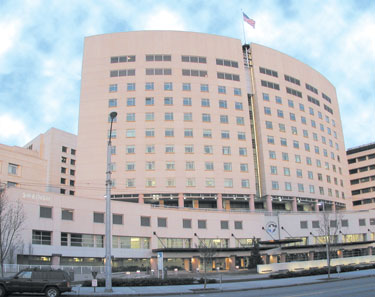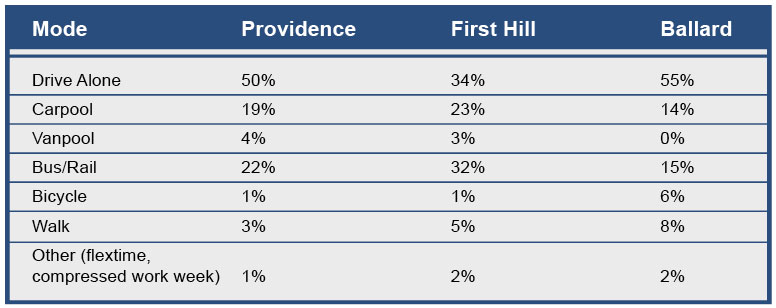Swedish Medical Center - Seattle, WA
FAST FACTS ABOUT: Swedish Medical Center
Types of TDM: Modal Shift
Keywords: Transit Subsidy, Ferry Subsidy, Parking Management,
Preferential Parking, Vanpool and Carpool subsidy, State and Local Mandates
Employer Demographics: Swedish has three campuses dispersed
throughout the greater Seattle area: First Hill in a downtown, dense,
area well served by transit and Ballard and Providence, less dense and
less transit service.
Program: Carpool promotion program expanded to include
transit, vanpool and parking benefits. Program is flexible given different
shifts and campuses.
Results: Varies with each campus, see table at end
of case study.
Cost of Program: $1.6 million for Flexpass, Puget Pass
and Washington State Ferry Pass
Staff: 1 FTE, Parking Manager/Employee Transportation
Coordinator dedicates 80 hours a month to transportation benefits program.
Contact: Karen Lee Kimber, Parking Manager/Employee
Transportation Coordinator, Karen.Kimber@swedish.org

Benefits Before and After State Mandate
Swedish Medical Center, in Seattle, WA, is comprised of three separate
campuses spread throughout the greater Seattle area. Swedish’s
7,000 employees and 2,000 physicians are accustomed to the irregular
work shifts and on-call realities of hospital work. Despite the challenges
inherent in scheduling and transportation, Swedish has supported transportation
benefits since the 1980’s. Carpools with three or more Swedish
staff received free parking at the Swedish campus and those with two
or more received a 50% parking subsidy. Employees were also eligible
for a 25% transit pass subsidy. In 1986, Swedish Hospital’s growth
resulted in the need for a new building. At the time, the City of Seattle
began to require all new construction and development plans whose fulfillment
would result in adverse effects on traffic and mobility to include a
transportation management program (TMP). The TMP included traffic and
mobility mitigation plans as well as reporting requirements and schedules.
In 1986, Swedish chose to focus their TMP and therefore, transportation
benefits, on carpool and transit benefits. Swedish continued to provide
free parking for vanpools, subsidized carpool parking and they extended
the transit subsidy to 50%.
In 1991, Washington State passed the Commute Trip Reduction (CTR) law.
The CTR law requires employers with more than 100 employees traveling
to work during peak morning times to provide commute alternative programs.
These programs must reduce the number of single-occupancy-vehicles (SOV)
on the roadway during morning commute times. Thus, since 1991, Swedish
has been required to develop programs that encourage employees to utilize
alternative, non-SOV modes of transportation for their commutes.
Swedish Medical Center strives to be
a best workplace, recruit and retain high quality nurses, doctors and
hospital staff and abide by the local and state mandates.
Motivation and Program Details
In addition to adherence to the CTR law, Swedish views their transportation
benefits program as a recruitment and retention tool. Hospitals all
over the country are experiencing nursing shortages and Swedish strives
to be an employer of choice. Given these motivations, Swedish worked
with the local rideshare and transit organization, to develop and implement
a variety of incentives and disincentives to driving alone. Through
the leadership of Swedish’s Employer Transportation Coordinator
(ETC), Swedish expanded the initial program to one that provides extensive
transit, ferry and rail subsidies, preferential parking and vanpool
subsidies.
Swedish tailors its transportation benefits for each of the three campuses
and for night and day shift employees. All day and evening shift employees
at each campus are eligible to receive a fully subsidized area transit
and rail pass, called a Flexpass, or a Washington State Ferry pass.
The Flexpass can be used on each of three adjoining county transit systems,
the regional transit system, regional commuter rail and the soon-to-be-built
monorail.
All employees with a Flexpass are eligible to participate in a county-sponsored
vanpool program. Each of the three adjoining counties, King, Pierce
and Snohomish, operates an extensive vanpool program. Swedish provides
a $63.00 a month vanpool subsidy for all employees. Given that most
vanpools do not exceed a cost of $63.00 a month, the vanpool subsidy
is often 100% for employees. All alternative mode users who receive
their Flexpass are eligible for the Guaranteed Ride Home (GRH) program
that includes 16 free taxi-rides home a year. Additionally, all Swedish
employees that work a 12-hour shift are eligible to participate in a
unique taxi service Swedish provides. Every weekday between 6:00-7:00pm,
employees with a Flexpass can take a taxi to specific park-&-ride.
The taxi service is an extra bonus designed to assist employees achieve
a quick and easy commute home after a long, over-time shift.
Parking
Bus service and parking availability is different at each of the three
campuses. The First Hill campus features fewer parking spaces and higher
levels of transit service than either the Ballard or Providence location.
Thus, the First Hill campus has limited all day shift SOV parking to
upper management since July 1990. SOV parking costs $70/month; carpool
parking is $12.50 per person per month and vanpools park free. Both
carpools and vanpools receive access to the best parking spaces at the
First Hill campus. Given the need for flexibility and the on-call realities
of hospital work, carpool and vanpool passengers receive four free SOV
parking days a month. Night shift employees at First Hill receive free
parking but are not eligible for a Flexpass. Instead, night shift employees
are eligible to receive a WA State Ferry pass and/or a dollar value
Puget Pass that covers their specific commute. The Puget Pass can be
used on all local and regional transit but is not valid for use on the
ferries.
Neither the Providence nor Ballard campuses receive high levels of bus
service. Additionally, parking is more plentiful at each campus. Therefore,
Swedish charges SOV’s $60 a month and carpools $12.50 per person
per month to park at the Providence Campus. Parking at the Ballard campus,
the smallest of the three campuses, is $30 a month for SOV parking and
free for carpoolers.
Role Modeling and Marketing
When the ETC was asked to take on full-time transportation benefits
and CTR reporting responsibilities, she responded by relinquishing her
SOV commute. Since then, she has tried most of the commute alternatives
Swedish provides and is able to use her own experience and understanding
of the process of commuting via vanpool, carpool and/or transit to encourage
employees to at least give it a try. To market the program, the ETC
sends out a fact sheet with bus route information, parking requirements
and costs, and Flexpass, carpool and vanpool benefits to each employee
when they are hired. This fact sheet is delivered to the employee’s
home along with two free transit passes to encourage transit usage on
their first day of work. Additionally, the ETC utilizes the intranet,
employee newsletters and new employee orientations to market the various
program elements. Swedish’s intranet includes information about
local merchant discounts for Flexpass holders, all transit, rail and
ferry schedules and services, adverse weather notices, links to the
regional Rideshare organization and parking pricing information.
Results
Swedish Medical Center strives to be a best workplace, recruit and retain
high quality nurses, doctors and hospital staff and abide by the local
and state mandates. Their efforts have resulted in the following modal
splits:
